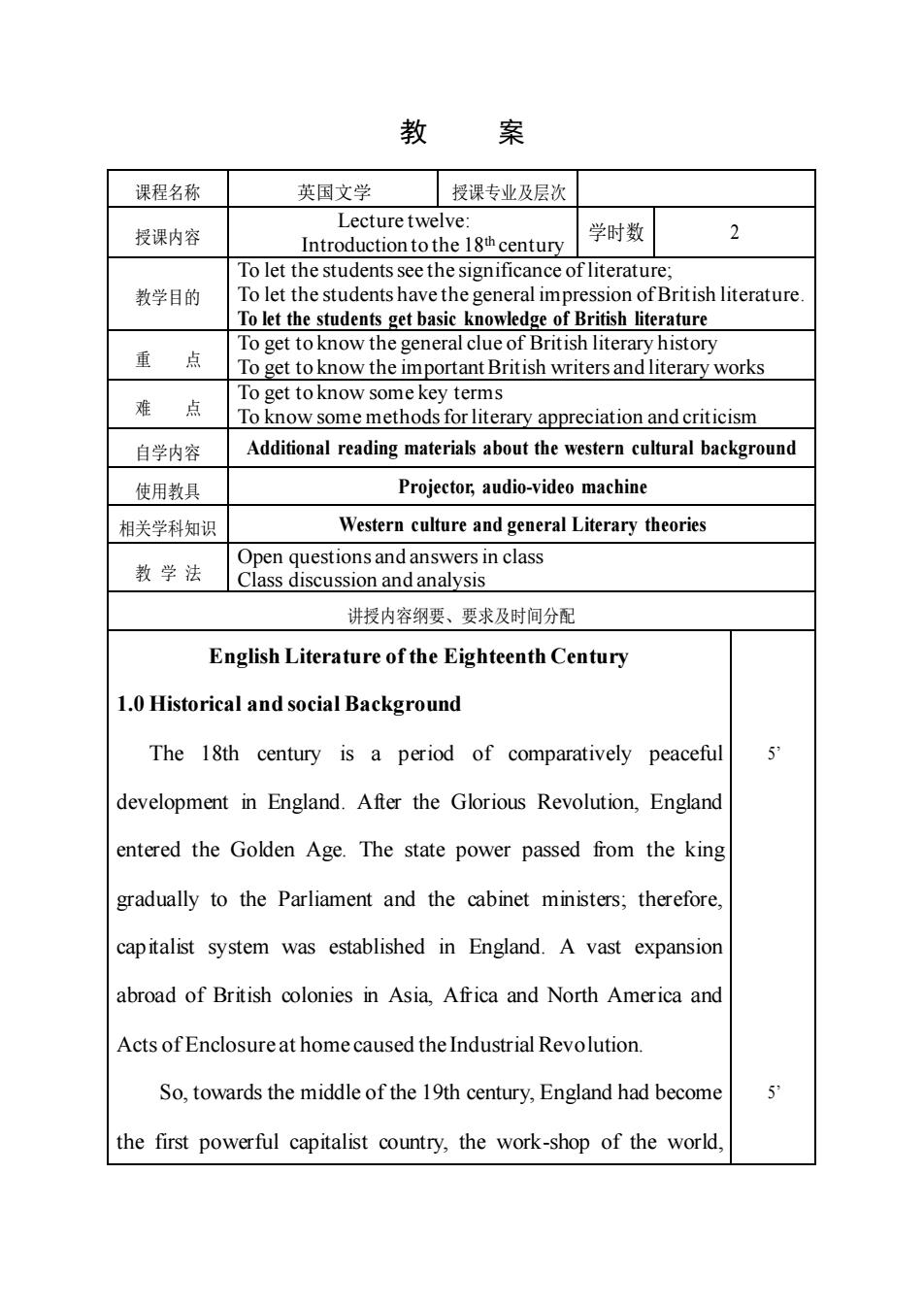
教 案 课程名称 英国文学 授课专业及层次 授课内容 Lecture twelve: 学时数 Introduction tothe 18 century 2 To let the students see the significance of literature: 教学目的 ssion of British literature To let the students get basic knowledge of British literature 重点 To get to know the general clue of British literary history To get to know the important British writers and literary works 难点 To get to know some key terms To know some methods for literary appreciation and criticism 自学内容 Additional reading materials about the western cultural background 使用教具 Projector,audio-video machine 相关学科知识 Western culture and general Literary theories Open questions and answers in class 教学法Class discussion and analysis 讲授内容纲要、要求及时间分配 English Literature of the Eighteenth Century 1.0 Historical and social Background The 18th century is a period of comparatively peaceful 5 development in England.After the Glorious Revolution,England entered the Golden Age.The state power passed from the king gradually to the Parliament and the cabinet ministers;therefore, capitalist system was established in England.A vast expansion abroad of British colonies in Asia,Africa and North America and Acts of Enclosure at home caused the Industrial Revolution. So,towards the middle of the 19th century,England had become the first powerful capitalist country,the work-shop of the world
教 案 课程名称 英国文学 授课专业及层次 授课内容 Lecture twelve: Introduction to the 18th century 学时数 2 教学目的 To let the students see the significance of literature; To let the students have the general impression of British literature. To let the students get basic knowledge of British literature 重 点 To get to know the general clue of British literary history To get to know the important British writers and literary works 难 点 To get to know some key terms To know some methods for literary appreciation and criticism 自学内容 Additional reading materials about the western cultural background 使用教具 Projector, audio-video machine 相关学科知识 Western culture and general Literary theories 教 学 法 Open questions and answers in class Class discussion and analysis 讲授内容纲要、要求及时间分配 English Literature of the Eighteenth Century 1.0 Historical and social Background The 18th century is a period of comparatively peaceful development in England. After the Glorious Revolution, England entered the Golden Age. The state power passed from the king gradually to the Parliament and the cabinet ministers; therefore, capitalist system was established in England. A vast expansion abroad of British colonies in Asia, Africa and North America and Acts of Enclosure at home caused the Industrial Revolution. So, towards the middle of the 19th century, England had become the first powerful capitalist country, the work-shop of the world, 5’ 5’
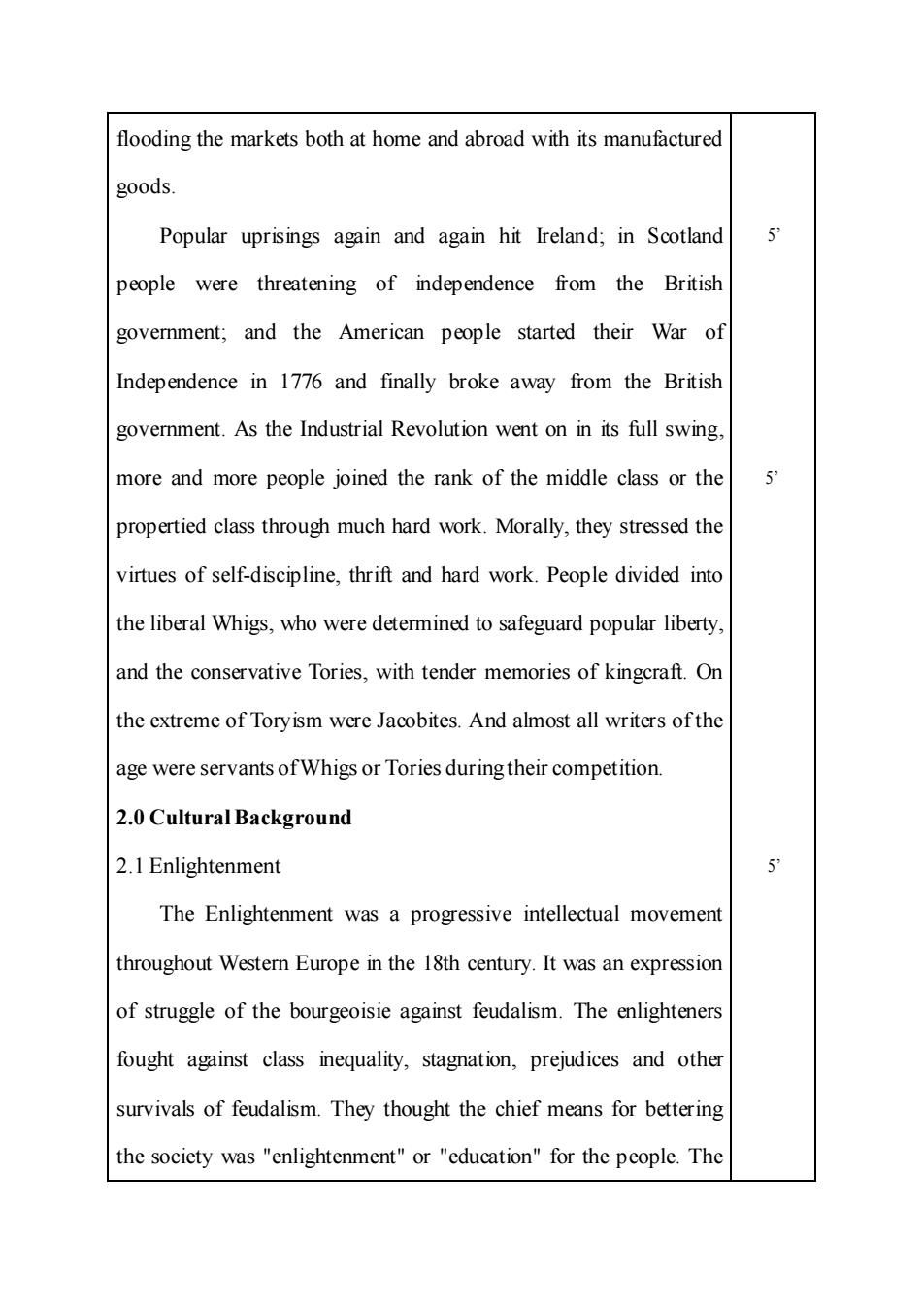
flooding the markets both at home and abroad with its manufactured goods. Popular uprisings again and again hit Ireland;in Scotland 5 people were threatening of independence from the British government;and the American people started their War of Independence in 1776 and finally broke away from the British government.As the Industrial Revolution went on in its full swing, more and more people joined the rank of the middle class or the 51 propertied class through much hard work.Morally,they stressed the virtues of self-discipline,thrift and hard work.People divided into the liberal Whigs,who were determined to safeguard popular liberty and the conservative Tories,with tender memories of kingcraft.On the extreme of Toryism were Jacobites.And almost all writers of the age were servants ofWhigsor Tories duringtheir competition. 2.0 Cultural Background 2.1 Enlightenment 5 The Enlightenment was a progressive intellectual movement throughout Western Europe in the 18th century.It was an expression of struggle of the bourgeoisie against feudalism.The enlighteners fought against class inequality,stagnation,prejudices and othe survivals of feudalism.They thought the chief means for bettering the society was "enlightenment"or "education"for the people.The
flooding the markets both at home and abroad with its manufactured goods. Popular uprisings again and again hit Ireland; in Scotland people were threatening of independence from the British government; and the American people started their War of Independence in 1776 and finally broke away from the British government. As the Industrial Revolution went on in its full swing, more and more people joined the rank of the middle class or the propertied class through much hard work. Morally, they stressed the virtues of self-discipline, thrift and hard work. People divided into the liberal Whigs, who were determined to safeguard popular liberty, and the conservative Tories, with tender memories of kingcraft. On the extreme of Toryism were Jacobites. And almost all writers of the age were servants of Whigs or Tories during their competition. 2.0 Cultural Background 2.1 Enlightenment The Enlightenment was a progressive intellectual movement throughout Western Europe in the 18th century. It was an expression of struggle of the bourgeoisie against feudalism. The enlighteners fought against class inequality, stagnation, prejudices and other survivals of feudalism. They thought the chief means for bettering the society was "enlightenment" or "education" for the people. The 5’ 5’ 5’
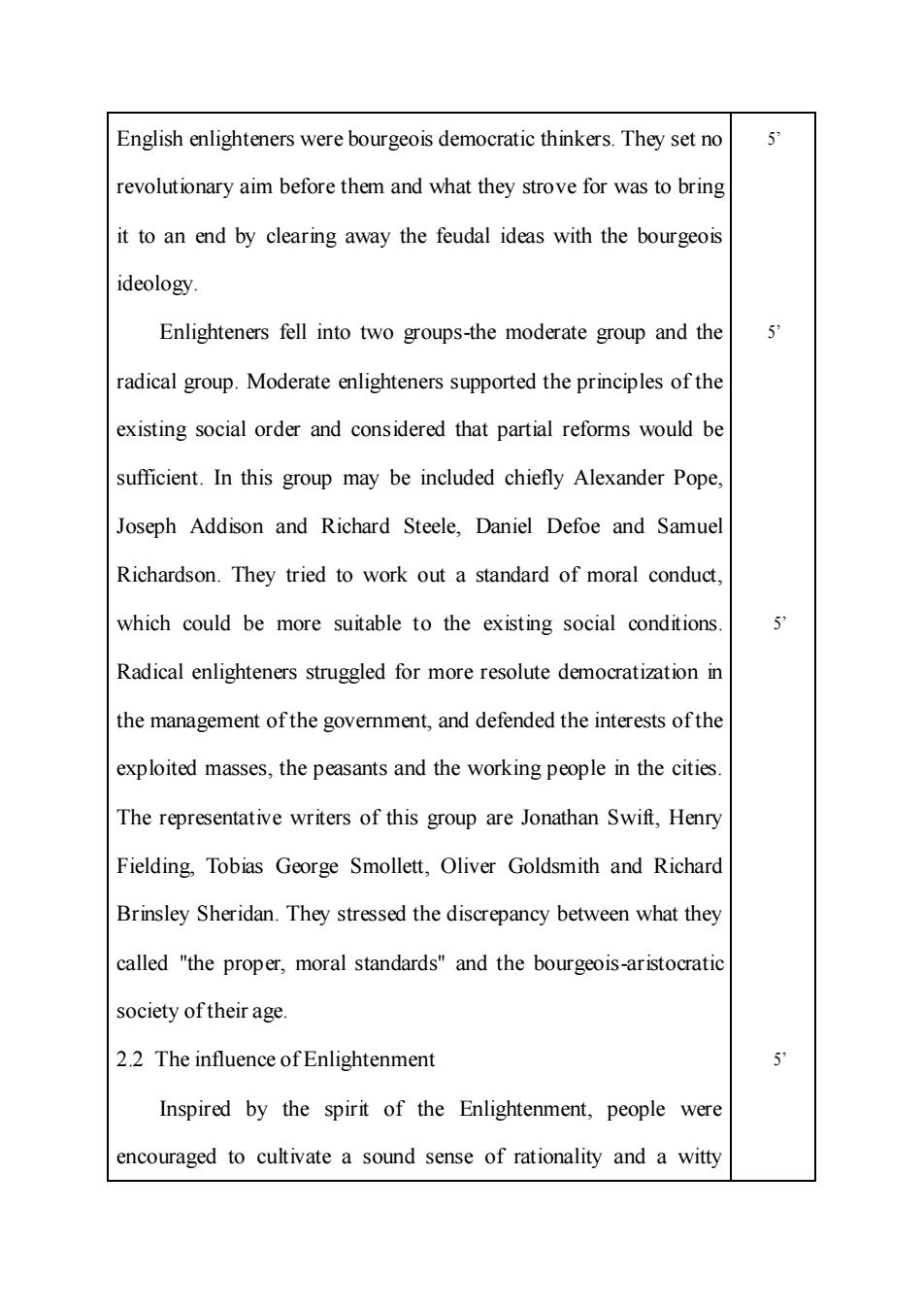
English enlighteners were bourgeois democratic thinkers.They set no 5 revolutionary aim before them and what they strove for was to bring it to an end by clearing away the feudal ideas with the bourgeois ideology. Enlighteners fell into two groups-the moderate group and the 5 radical group.Moderate enlighteners supported the principles of the existing social order and considered that partial reforms would be sufficient.In this group may be included chiefly Alexander Pope. Joseph Addison and Richard Steele,Daniel Defoe and Samuel Richardson.They tried to work out a standard of moral conduct, which could be more suitable to the existing social conditions. 小 Radical enlighteners struggled for more resolute democratization in the management of the government,and defended the interests ofthe exploited masses,the peasants and the working people in the cities The representative writers of this group are Jonathan Swif,Henry Fielding,Tobias George Smollett,Oliver Goldsmith and Richard Brinsley Sheridan.They stressed the discrepancy between what they called "the proper,moral standards"and the bourgeois-aristocratic society of their age. 2.2 The influence of Enlightenment Inspired by the spirit of the Enlightenment,people were encouraged to cultivate a sound sense of rationality and a witty
English enlighteners were bourgeois democratic thinkers. They set no revolutionary aim before them and what they strove for was to bring it to an end by clearing away the feudal ideas with the bourgeois ideology. Enlighteners fell into two groups-the moderate group and the radical group. Moderate enlighteners supported the principles of the existing social order and considered that partial reforms would be sufficient. In this group may be included chiefly Alexander Pope, Joseph Addison and Richard Steele, Daniel Defoe and Samuel Richardson. They tried to work out a standard of moral conduct, which could be more suitable to the existing social conditions. Radical enlighteners struggled for more resolute democratization in the management of the government, and defended the interests of the exploited masses, the peasants and the working people in the cities. The representative writers of this group are Jonathan Swift, Henry Fielding, Tobias George Smollett, Oliver Goldsmith and Richard Brinsley Sheridan. They stressed the discrepancy between what they called "the proper, moral standards" and the bourgeois-aristocratic society of their age. 2.2 The influence of Enlightenment Inspired by the spirit of the Enlightenment, people were encouraged to cultivate a sound sense of rationality and a witty 5’ 5’ 5’ 5’

intellectuality.More schools were set up.The Copyright Act of 1709 made,for the first time in English history,literary creation an honorable and independent profession. Besides the popular forms of poetry,novel and drama,the 5 period also saw the appearance of such popular press as pamphlets and newspapers and periodicals.And there was also the flourish of coffee houses and all kinds of social clubs,(about 2000 in London.) which greatly helped the cultivation and promotion of the new English culture. However,in the later part of the century,people began to feel 5 discontented with the rigidity of rationality.A demand for a release of one's spontaneous feeling,a relaxation from the cold and rigid logic of rationality and an escape from,the inhuman Industrial Revolution gradually took shape in the form of sentimental and pre-romantic novel and poetry. 3.0 Characteristics of the Literature The main literary stream of the 18th century was realism.Wha the writers described in their works were social realities.The main characters were usually common men.Most of the writers concentrated their attention on daily life.Literature included book newspaper,magazine,and pamphlets.Prose had a rapid development in this age,so the 18th century wasan age of prose
intellectuality. More schools were set up. The Copyright Act of 1709 made, for the first time in English history, literary creation an honorable and independent profession. Besides the popular forms of poetry, novel and drama, the period also saw the appearance of such popular press as pamphlets and newspapers and periodicals. And there was also the flourish of coffee houses and all kinds of social clubs, (about 2000 in London.) which greatly helped the cultivation and promotion of the new English culture. However, in the later part of the century, people began to feel discontented with the rigidity of rationality. A demand for a release of one's spontaneous feeling, a relaxation from the cold and rigid logic of rationality and an escape from, the inhuman Industrial Revolution gradually took shape in the form of sentimental and pre-romantic novel and poetry. 3.0 Characteristics of the Literature The main literary stream of the 18th century was realism. What the writers described in their works were social realities. The main characters were usually common men. Most of the writers concentrated their attention on daily life. Literature included book, newspaper, magazine, and pamphlets. Prose had a rapid development in this age, so the 18th century was an age of prose. 5’ 5’ 5’
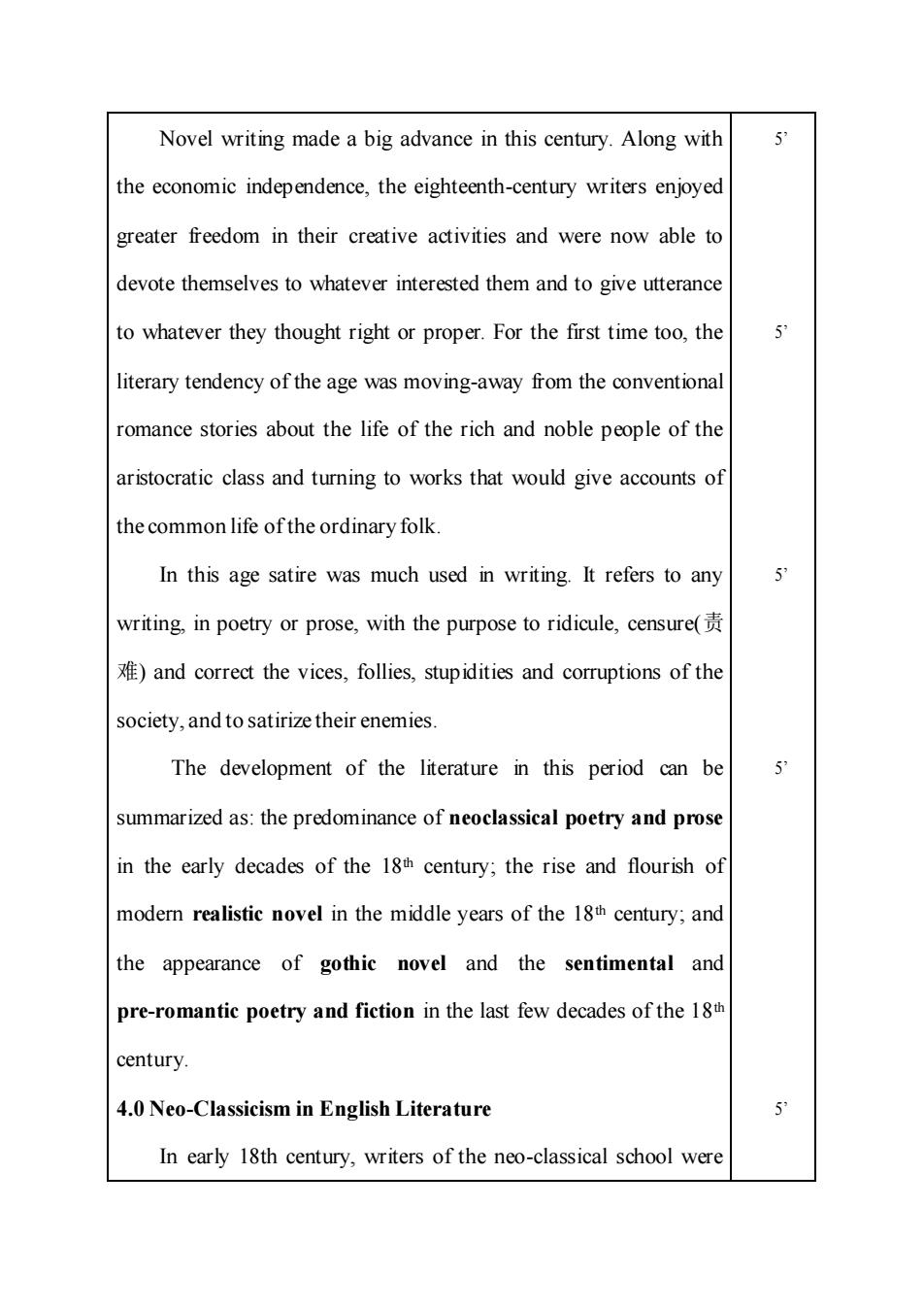
Novel writing made a big advance in this century.Along with 5 the economic independence,the eighteenth-century writers enjoyed greater freedom in their creative activities and were now able to devote themselves to whatever interested them and to give utterance to whatever they thought right or proper.For the first time too,the 5 literary tendency of the age was moving-away from the conventional romance stories about the life of the rich and noble people of the aristocratic class and turning to works that would give accounts of the common life of the ordinary folk. In this age satire was much used in writing.It refers to any 5 writing,in poetry or prose,with the purpose to ridicule,censure( )and correct the vices,follies,stupidities and corruptions of the society,and to satirize their enemies. The development of the literature in this period can be 5 summarized as:the predominance of neoclassical poetry and prose in the early decades of the 18th century;the rise and flourish of modern realistic novel in the middle years of the 18th century;and the appearance of gothic novel and the sentimental and pre-romantic poetry and fiction in the last few decades of the 18th century. 4.0 Neo-Classicism in English Literature 5 In early 18th century,writers of the neo-classical school were
Novel writing made a big advance in this century. Along with the economic independence, the eighteenth-century writers enjoyed greater freedom in their creative activities and were now able to devote themselves to whatever interested them and to give utterance to whatever they thought right or proper. For the first time too, the literary tendency of the age was moving-away from the conventional romance stories about the life of the rich and noble people of the aristocratic class and turning to works that would give accounts of the common life of the ordinary folk. In this age satire was much used in writing. It refers to any writing, in poetry or prose, with the purpose to ridicule, censure(责 难) and correct the vices, follies, stupidities and corruptions of the society, and to satirize their enemies. The development of the literature in this period can be summarized as: the predominance of neoclassical poetry and prose in the early decades of the 18th century; the rise and flourish of modern realistic novel in the middle years of the 18th century; and the appearance of gothic novel and the sentimental and pre-romantic poetry and fiction in the last few decades of the 18th century. 4.0 Neo-Classicism in English Literature In early 18th century, writers of the neo-classical school were 5’ 5’ 5’ 5’ 5’
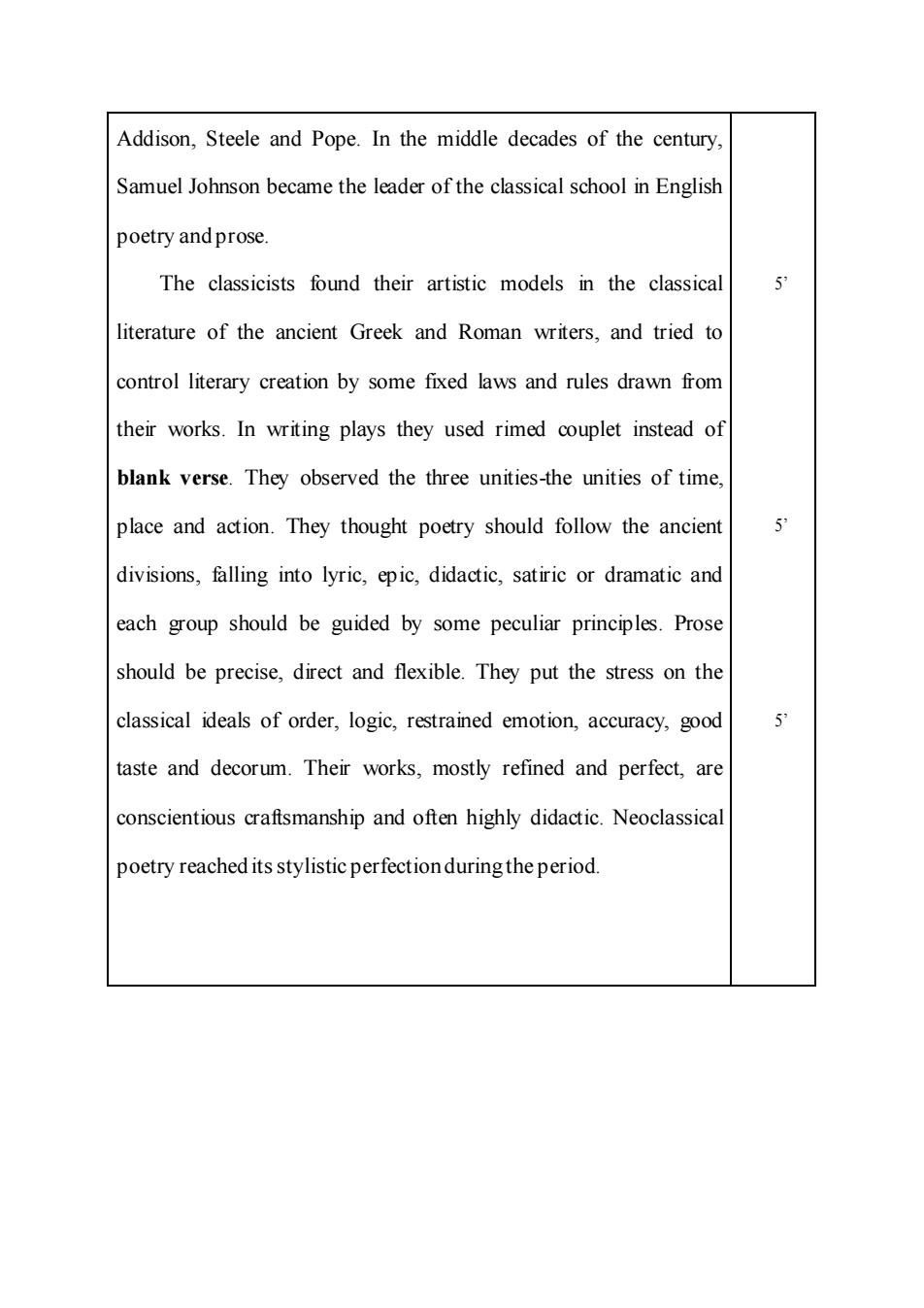
Addison,Steele and Pope.In the middle decades of the century, Samuel Johnson became the leader of the classical school in English poetry and prose. The classicists found their artistic models in the classical 5 literature of the ancient Greek and Roman writers,and tried to control literary creation by some fixed laws and rules drawn from their works.In writing plays they used rimed couplet instead of blank verse.They observed the three unities-the unities of time. place and action.They thought poetry should follow the ancient 5 divisions,falling into lyric,epic,didactic,satiric or dramatic and each group should be guided by some peculiar principles.Prose should be precise,direct and flexible.They put the stress on the classical ideals of order,logic,restrained emotion,accuracy,good 八 taste and decorum.Their works,mostly refined and perfect,are conscientious craftsmanship and often highly didactic.Neoclassical poetry reached its stylistic perfectionduring the period
Addison, Steele and Pope. In the middle decades of the century, Samuel Johnson became the leader of the classical school in English poetry and prose. The classicists found their artistic models in the classical literature of the ancient Greek and Roman writers, and tried to control literary creation by some fixed laws and rules drawn from their works. In writing plays they used rimed couplet instead of blank verse. They observed the three unities-the unities of time, place and action. They thought poetry should follow the ancient divisions, falling into lyric, epic, didactic, satiric or dramatic and each group should be guided by some peculiar principles. Prose should be precise, direct and flexible. They put the stress on the classical ideals of order, logic, restrained emotion, accuracy, good taste and decorum. Their works, mostly refined and perfect, are conscientious craftsmanship and often highly didactic. Neoclassical poetry reached its stylistic perfection during the period. 5’ 5’ 5’